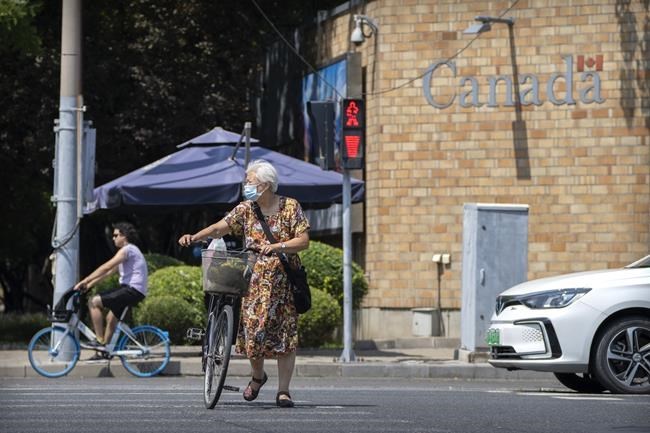BEIJING (AP) — A Canadian entrepreneur who was charged with spying after his government arrested an executive of Chinese tech giant Huawei faces a possible verdict Wednesday as Beijing steps up pressure on Canada ahead of a court ruling on whether to hand over the executive to face U.S. criminal charges.
Michael Spavor and another Canadian were detained in China in what critics labeled “hostage politics” after the executive’s 2018 arrest in connection with possible violations of trade sanctions on Iran. On Tuesday, a court rejected the appeal of a third Canadian whose prison term in a drug case was abruptly increased to death following the executive's arrest.
Canada and other governments including Australia and the Philippines face growing Chinese pressure including trade boycotts in disputes over human rights, the coronavirus and territorial claims. Washington has warned Americans they face "a heightened risk of arbitrary detention” in China for reasons other than to enforce the law.
Canadian Ambassador Dominic Barton said he would go to see Spavor in Dandong, about 210 miles (340 kilometers) east of Beijing on the North Korean border.
Asked when a ruling might come, Barton said, “our sense is, it’s tomorrow.” As for the second detained Canadian, former diplomat Michael Kovrig, the ambassador said, “we have not received any indication of that.”
Meng Wanzhou, the chief financial officer of Huawei Technologies Ltd., was arrested Dec. 1, 2018, in Vancouver on U.S. charges of lying to the Hong Kong arm of the British bank HSBC about possible dealings with Iran in violation of trade sanctions.
A judge in Vancouver is due to hear final arguments in the next few weeks about whether Meng should be extradited to the United States. Her lawyers argue the case is politically motivated and what she is accused of isn’t a crime in Canada.
China’s government has criticized the arrest as part of U.S. efforts to hamper its technology development. Huawei, a maker of network equipment and smartphones, is China’s first global tech brand and is at the center of U.S.-Chinese tension over technology and security.
On Tuesday, the Higher People’s Court of Liaoning province in the northeast rejected an appeal by Robert Schellenberg, whose 15-year prison term on drug smuggling charges was increased to death in January 2019 following Meng’s arrest.
The court sent the case to China’s supreme court for review, a required step before a death sentence can be carried out.
The Canadian government criticized the ruling as arbitrary and the penalty as “cruel and inhumane.”
“We condemn the verdict in the strongest possible terms and call on China to grant Robert clemency,” Ambassador Barton told reporters by phone after attending the appeals hearing in Shenyang, about 12 miles (20 kilometers) west of Dandong.
Schellenberg was convicted of smuggling 222 kilograms (448 pounds) of methamphetamine, according to the court.
Asked whether the three cases were linked to Meng’s, Barton said, “I don’t think it’s a coincidence these are happening right now while events are going on in Vancouver.” He said the case was “part of the geopolitical process.”
He said Canadian diplomats talked with Schellenberg after the ruling but declined to give details.
“He is remarkably composed,” Barton said. “We had a good conversation.”
Diplomats from the United States, Germany, Australia and France attended Tuesday’s hearing, according to Barton. He expressed thanks to them and other governments for expressing support for Canada.
Two other Canadians, Fan Wei and Xu Weihong, also were sentenced to death on drug charges in separate cases in 2019 as relations between Beijing and Ottawa soured.
The Huawei case is one of a series of conflicts between Beijing and other governments over China’s technology ambitions, the coronavirus, human rights, Hong Kong and claims to control over the Â鶹ĘÓƵ China and East China Seas.
China has tried to pressure Canadian Prime Minister Justin Trudeau's government by imposing restrictions on imports of canola seed oil and other products from Canada.
Meanwhile, Beijing is blocking imports of Australian wheat, wine and other products after its government called for an investigation into the origin of the coronavirus pandemic.
Joe Mcdonald, The Associated Press




